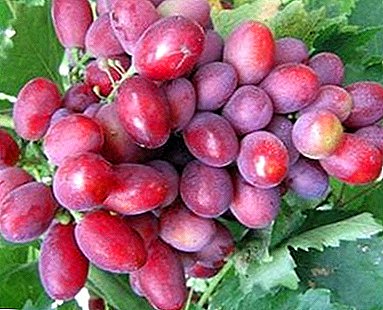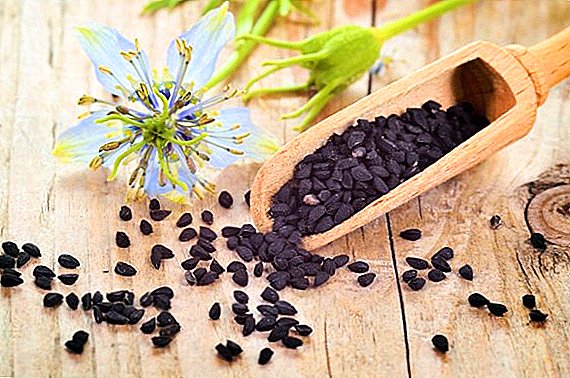 Black cumin as a seasoning and medicinal plant is known to people from ancient times.
Black cumin as a seasoning and medicinal plant is known to people from ancient times.
This article provides a detailed description of the plant, its composition, uses and useful properties.
Description and characteristics of black cumin
This herbaceous annual plant of the buttercup family grows up to 40 cm in height. The root system is pivotal, fusiform. The stem of the plant is branched, smooth, straight. Leaves alternate with long petioles, dissected. The color of the foliage is gray-green. The closer the foliage to the top, the smaller the size of the leaf plates.

The flowering period of the described plant begins in May and lasts until mid-August. Flowers are not large, pyatilepestkovye, white. In August, oblong-shaped black visopods ripen, which in the stage of full ripeness break up into two curved halves.
Did you know? Archaeologists have discovered in Egyptian tombs vessels with black cumin oil. From the written artifacts found, it is clear that the product was valued as a medicine, including an antidote to snake bites.
The chemical composition of the product
The pronounced strong aroma of the plant indicates the presence in the composition of essential oils. In addition to esters, it contains a large amount of fatty oils, rich in fatty and amino acids, and this is not the full composition. Due to the rich combination of various substances, antioxidants and flavonoids, enzymes and carotenoids, black cumin oil is valued in medicine and cosmetology.

Minerals
Minerals are represented by an impressive group of macro- and microelements, most of which satisfy the daily needs of the body.
Consider them in detail in the table:
| Macronutrients (% / daily allowance) | Trace elements (% / daily allowance) |
| potassium - 71.5; | iron - 368.7; |
| calcium - 93.1; | manganese - 165.5; |
| magnesium - 91.5; | selenium - 10.2; |
| sodium, 12.9; | zinc - 40 | phosphorus - 62.4 | - |
Vitamin composition
The balance of vitamins in the body is important for the operation of all its systems, and cumin contains most of the elements necessary for health.
But the product is really rich in the following vitamins (% of the daily requirement):
- beta carotene - 1240;
- thiamine (B1) - 42;
- pyridoxine (B5) - 22;
- tocopherol (E) - 22.2.

Ascorbic and folic acid, choline and riboflavin are present in small quantities in the product.
Black Cumin Calories
The amount of calories of a product per 100 g of the edible part looks negative for those who watch the weight: 375 kcal per 100 g of spice.
But if you consider that it is seasoning, and not the main course, then everything is not as scary as it seems:
- in 1 tsp - 18.7 kcal;
- in 1 tbsp. l - 57.4 kcal.
Did you know? The curative properties of cumin are mentioned in the Bible, the Quran and the treatises of Indian medicine Ayurveda.
Properties of the plant for the human body
Given the above composition, it is easy to imagine the effect that a product can have on health with regular consumption.
Beneficial features
Black cumin is used in official and traditional medicine.

The plant has a wide range of therapeutic actions:
- antiseptic;
- pain killer;
- carminative;
- choleretic;
- healing;
- diuretic;
- expectorant;
- anti-inflammatory,
- antifungal,
- antiparasitic,
- antispasmodic;
- tonic;
- soothing.
Cumin is useful for chronic fatigue. The product will help restore the vitamin and mineral balance, normalizes sleep and improves concentration. The plant helps to clear the blood of cholesterol deposits, lower blood pressure. With chronic anemia, it will replenish iron stores, increase hemoglobin levels.
The plant is used in the treatment of skin diseases: it promotes cell regeneration. Oil, applied externally, relieves itching for eczema and psoriasis, slows down atypical cell division of the dermis. Effective oil lotion from warts, acne.

Seeds have an antibacterial effect, perfectly clean the mouth, leveling an unpleasant odor. The same effect the product has on the appearance of putrefactive bacteria in the digestive organs. The use of seasoning increases appetite, improves digestive processes and normalizes the secretion of gastric juice.
During seasonal diseases, cumin is a remedy for inflammatory processes in the nasopharynx and sputum in the lungs. Essential oils during inhalation destroy pathogenic bacteria and increase the body's defenses.
We recommend reading about the peculiarities of using black cumin oil for colds and respiratory diseases.
Lactating mothers, faced with mastitis, lotions on the basis of oil will help reduce inflammation - they contribute to the resorption of the seal in the chest. And decoctions of seeds improve lactation.
For men, the plant will help to cope with the problems of potency: it increases the production of male hormones, increases sexual desire. Elderly people can use the product for the prevention of atherosclerosis, pain relief for gout, age-related arthritis and rheumatism.
Possible harm and contraindications
The composition of the black cumin many active substances that can be harmful in some conditions or exacerbate chronic disease during the recurrence period.

It is strictly contraindicated to use cumin in such cases:
- pregnancy;
- severe diabetes;
- exacerbation of diseases of internal organs;
- ischemia;
- recently suffered a heart attack or stroke;
- people who have transplanted internal organs;
- children up to 3 years.
Important! Be wary of taking the product inside nursing mothers. - you should first consult with your doctor. The manifestation of a side effect may be an allergic reaction in the baby.
Main applications
Black cumin is primarily a spice.
In cooking, it is used almost everywhere:
- in baking;
- in marinades and sauces, gas stations;
- in soups and borscht;
- in side dishes;
- in meat, poultry, fish dishes;
- in salads;
- in conservation.
In addition to medicine, it actively uses all parts of the plant and cosmetology. Cumin is an ingredient in skin care products. It actively nourishes, moisturizes and whitens the skin, effectively fights acne and acne, normalizes the work of sebaceous glands and promotes the regeneration of dermal cells.

The product is added to hair care products: it gives them shine, strength, strengthens the follicles, restores the hairline. Means with cumin in the composition improves blood circulation in the system of blood vessels and capillaries of the head, thereby contributing to the treatment of baldness. Favor spices and nutritionists.
The use of the product helps to improve metabolic processes in the body:
- protein;
- carbohydrate;
- lipid.
Phytoestrogens as a part of seasoning effectively break down fats, preventing them from accumulating. Cumin contributes to normal water-salt balance. Fiber in its composition gently removes the remnants of undigested food, cleansing the intestines.
Important! When using the plant externally, make sure that the product does not cause any negative effects on the skin: test it on the wrist.
The use of spicy black seeds in cooking will give the dish a pleasant aroma and taste. At the same time useful elements in the composition of the seasoning will have a beneficial effect on the body.












